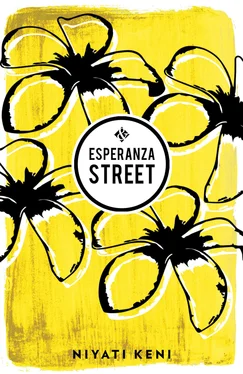Luisa moved into our father’s apartment with her children to sort through his things. I offered, reluctantly, to help, but she picked impatiently through everything I did until I left her to it. At first Lorna and the baby, Marisol, remained in the apartment too, which vexed my sister no end but, aware of how it might seem if she asked them to leave straight away, she decided to ignore them instead. She wouldn’t let Lorna help, other than leaving her to tend all the children at once. Luisa’s children, sensitive to their mother’s dislike of Lorna, were disobedient and made this more difficult than it ought to have been, which Luisa seized upon as proof of Lorna’s ineptitude and the reason why she had attached herself so readily to our father. Luisa’s only concession was to accept the meals that Lorna presented her with and which, I later found out, had been paid for by Missy. Lorna, without any real claim to the place, was careful around us. Quiet and deferential towards my sister, she fetched and carried as Luisa decreed. I felt uncomfortable seeing Luisa ordering her about like a servant; my father had never treated her that way. But Lorna seemed happy enough to comply.
Outside, the House-on-Wheels took up temporary encampment in the courtyard, but Luisa wouldn’t let its other occupants, especially the children, into the apartment, and watched them closely whenever they came to the door. I’d have let them inside to see Lorna at least, but Luisa wouldn’t have it. Missy Bukaykay, when she came, clicked her tongue at Luisa from time to time but my sister remained obstinate. Lottie and Lando hung on, uncertain when their daughter would be rejoining them. I wasn’t sure what she was waiting for either but I didn’t want to ask. More than once I overheard her crying, being comforted by Elisa who said to me later, ‘She doesn’t want to take Marisol back on the streets.’ She said it as if she was asking a question I ought to have an answer to, and I was annoyed at her tone, but I was even more annoyed with Lorna for not crying over my father.
‘Can hardly blame her,’ Missy said.
‘It’s what she knows,’ Luisa snapped. ‘She had her time living off him.’
‘She kept house,’ Elisa said. ‘She kept it real clean.’
‘I’d take her back with me as a maid, but then there’s the baby. I’ve got enough to deal with at home,’ Luisa said.
Without a purpose in the apartment, Lorna took Marisol outside to be entertained by the other children. ‘It’s a shame,’ Missy said looking straight at me after they’d left.
It was a hot day. From time to time the sound of the children in the courtyard drifted in through the open door and windows. Occasionally Lottie or Elisa or Bina’s voice came up, chiding the kids into a briefly sustained order. Inside, we mostly worked in silence. Luisa was brisk and bossed me around but I didn’t mind. She spoke more softly to Missy and to Bina when she came in to help. To Elisa she spoke quietly but didn’t look at her when addressing her. I was sure Elisa minded but she didn’t say anything. Maybe she figured Luisa would be gone in a day or two and, with both parents now dead, she might never return.
When it was time for me to return to the boarding house, Missy got up to leave too. The afternoon air felt thick as we stepped out into the hallway together. In the courtyard the children were flinging water at each other from a pail. Lorna stood by the House-on-Wheels holding Marisol to her and fanning her gently with her hand. She lowered the baby into the cart, wedging her into place on the bedding pile, one side against a sack of rice, the other against the shoeshine boxes. The baby started to whine at being put down. I called a greeting at Lottie and Lando and, leaning over the side of the House, waved at Marisol. At the movement, Marisol quietened, but only for a moment. Lorna picked her up again to soothe her. ‘She likes him more than you!’ said Lottie to Lando, nodding at me.
‘We all know I wouldn’t win any beauty contests,’ Lando replied.
‘I could’ve married a rich man at least,’ said Lottie.
It sounded like the start of an old game but Lorna wasn’t playing along this time. ‘Babies don’t know nothing about looks or money,’ she said stiffly. She smiled at me hesitantly. I wondered if she felt she couldn’t return to the apartment if Missy or I were not there. But it couldn’t be helped; I couldn’t stay there all evening to her convenience. Still, I felt guilty, and shot a look at the baby as I turned to go. Missy and I stepped out of the courtyard into the alley. Behind us, Lorna started to croon softly to Marisol, a Rey Valera song, one of my father’s favourites.
Missy was quiet as we walked in the direction of the Bukaykay shack. ‘Lots going to be changing around here,’ she said eventually, looking in the direction of the jetty where the blackened remains of the market hall still lay where they’d fallen. ‘People are already talking about leaving.’
‘The whole place feels different now anyway.’
She nodded. ‘The fight’s gone out of people.’
‘Maybe they can’t win,’ and even as I said it I wondered why I hadn’t said we .
If Missy noticed, she ignored it. ‘Why do you think she’s not left yet?’ she said. I thought about saying Who? as if I didn’t know she was talking about Lorna. ‘If your father was here he’d be hoping you’d give her a reason to stay.’ Missy stared at me but I ignored her, concentrated on walking. ‘Suelita’s off to nursing college soon. She won’t wait for no one now. Maybe she’ll marry a doctor. Or get work stateside.’ I blushed. ‘You think I don’t know you like my own?’
‘If she matters so much to you, make Fidel marry her.’
‘What are you saying now?’ Missy was annoyed but she didn’t say another word after that.
By the time I got back to the boarding house I’d worked myself up into a temper and I was heavy-handed about the kitchen until America reminded me sharply that I could take my bad mood out on my own possessions.
I was still seething when we sat down to eat together after the rest of the household had finished. America looked tired and I wondered if her rash was giving her trouble again, but I didn’t ask. She’d made bibingka , one of my favourites, and saved a large piece for me. She watched me closely as I ate. ‘What are you sweetening me up for?’ I said.
‘Who says it’s for you?’
I didn’t reply, which seemed to irritate her suddenly. ‘I’m getting pretty tired of this,’ she snapped. I stared at her, waited. She always said stuff like that. This time she kept me waiting for longer than usual. ‘I’m going home,’ she said, ‘for good. The end of the month.’ She was cunning; she’d waited for me to fill my mouth before she said it. I stopped chewing and she added testily, ‘Don’t go trying to make me feel bad.’
I thought about being at the Bougainvillea without her. Because of my duties at the boarding house I’d never really had the chance to cultivate friendships to the extent that other boys at school did and, though I was well enough regarded there I suppose, I wasn’t popular. I didn’t have my own crowd. The other big houses at our end of Esperanza also had houseboys, but none my age, and on the occasions we met they talked lightly about what could be taken from the household that wouldn’t be missed or which of their employers’ children regularly broke curfew or kept bad company — conversations that made me uncomfortable, as if I was complicit simply by listening.
America looked disapprovingly at my plate, the bibingka left half eaten. She got up, leaving me to tidy up the dishes while she went to find Aunt Mary. There was little else to do and I waited in the silent kitchen for her to return before giving up and retiring to my room.
Читать дальше












